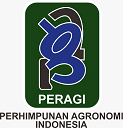Genetic Purity Analysis of Maize (Zea mays L.) Hybrid Seed and Their Parents Produced in Different Seed Companies of Ethiopia
Abstract
Keywords
Full Text:
PDFReferences
Adebisi, M. A., Kehinde, T. O., Porbeni, J. B. O., Oduwaye, O. A., Biliaminu, K., & Akintunde, S. A. (2013). Seeds and seedlings vigour in tropical maize inbred lines. Plant Breeding and Seed Science, 67, 87–102.
Bako National Maize Research Center, B. (2011). MASA Program of Maize. Ethiopia Television (ETV).
Central Statistics Agency. (2020). Agricultural Sample Survey 2019/20 Report on Area and Production of Major. Statistical Bulletin 584.
Chen, J., Zavala, C., Ortega, N., Petroli, C., Franco, J., Burgueño, J., Costich, D. E., & Hearne, S. J. (2016). The development of quality control genotyping approaches: a case study using elite maize lines. PLoS One, 11(6), 61–70.
Cooke, R. J. (1995). Gel electrophoresis for the identification of plant varieties. Journal of Chromatography A, 698(1–1), 281–299.
Elshire, R. J., Glaubitz, J. C., Sun, Q., Poland, J. A., Kawamoto, K., Buckler, E. S., & Mitchell, S. E. (2011). A Robust, Simple Genotyping-by-Sequencing (GBS) Approach for High Diversity Species. PLoS ONE, 6(5), e19379. https://doi.org/10.1371/journal.pone.0019379
Ertiro, B. T., Ogugo, V., Worku, M., Das, B., Olsen, M., Labuschagne, M., & Semagn, K. (2015). Comparison of Kompetitive Allele Specific PCR (KASP) and genotyping by sequencing (GBS) for quality control analysis in maize. BMC Genomics, 16(1), 908. https://doi.org/10.1186/s12864-015-2180-2
Ertiro, B. T., Semagn, K., Das, B., Olsen, M., Labuschagne, M., Worku, M., Wegary, D., Azmach, G., Ogugo, V., Keno, T., Abebe, B., Chibsa, T., & Menkir, A. (2017). Genetic variation and population structure of maize inbred lines adapted to the mid-altitude sub-humid maize agro-ecology of Ethiopia using single nucleotide polymorphic (SNP) markers. BMC Genomics, 18(1), 777. https://doi.org/10.1186/s12864-017-4173-9
Gowda, M., Worku, M., Nair, S. K., Palacios-Rojas, N., & Prasanna, B. M. (2017). Quality Assurance/Quality Control (QA/QC) in Maize Breeding and Seed Production. Theory and Practice.
Ilyas, S. (2012). Ilmu dan Teknologi Benih Teori dan Hasil-Hasil Penelitian. IPB Press.
Khan, N., Kazmi, R. H., Willems, L. A., Van Heusden, A. W., Ligterink, W., & Hilhorst, H. W. (2012). Exploring the natural variation for seedling traits and their link with seed dimensions in tomato.
Prasad, C. S., Anandan, S., Gowda, N. K. S., Schlecht, E., Buerkert, A., Gollner, G., Starz, W., Friedel, J. K., Zhou, H., Zhang, M., Liu, Z., Zheng, W., Zhu, Q., Wan, Y., Sokolov, V., VanderZaag, A., Habtewold, J., Dunfield, K., Wagner-Riddle, C., … Yu, W. (2019). Farmyard manure improves phosphorus use efficiency in weathered P deficient soil. Nutrient Cycling in Agroecosystems, 115(3), 43–59. https://doi.org/10.1007/s10705-020-10054-0
Purba, J. H. (2020). Adaptasi Varietas Dan Galur Jagung Pada Lahan Marginal. Jurnal Agrohita, 5(1), 82–93.
Sadjad, S. (1993). Dari benih kepada benih. PT Gramedia Widiasarana Indonesia.
Salgado, K. C. P. D. C., Vieira, D. G. G. C., Von Pinho, É. V. D. R., Guimarães, C. T., Von Pinho, R. G., & Souza, L. V. D. (2006). Genetic purity certificate in seeds of hybrid maize using molecular markers. Revista Brasileira de Sementes, 28(1), 169–175.
Semagn, K. (2014). Leaf tissue sampling and DNA extraction protocols. In Molecular Plant Taxonomy (pp. 53–67). Humana Press.
Semagn, K., Beyene, Y., Makumbi, D., Mugo, S., Prasanna, B. M., Magorokosho, C., & Atlin, G. (2012). Quality control genotyping for assessment of genetic identity and purity in diverse tropical maize inbred lines. Theoretical and Applied Genetics, 125(7), 1487–1501.
Wani, M. A., Khan, G. H., Gazal, A., & Lone, R. A. (2017). Genetic Purity Analysis in Maize under Temperate Conditions. Int. J. Curr. Microbiol. App. Sci, 6(9), 2710–2722.
Zivanovic, T., Vracarevic, M., Krastanovic, S., & Surlan Gordana, G. (2004). Selection on uniformity and yield stability in maize. Journal of Agricultural Sciences, 20(1), 117-130.
Refbacks
- There are currently no refbacks.


























